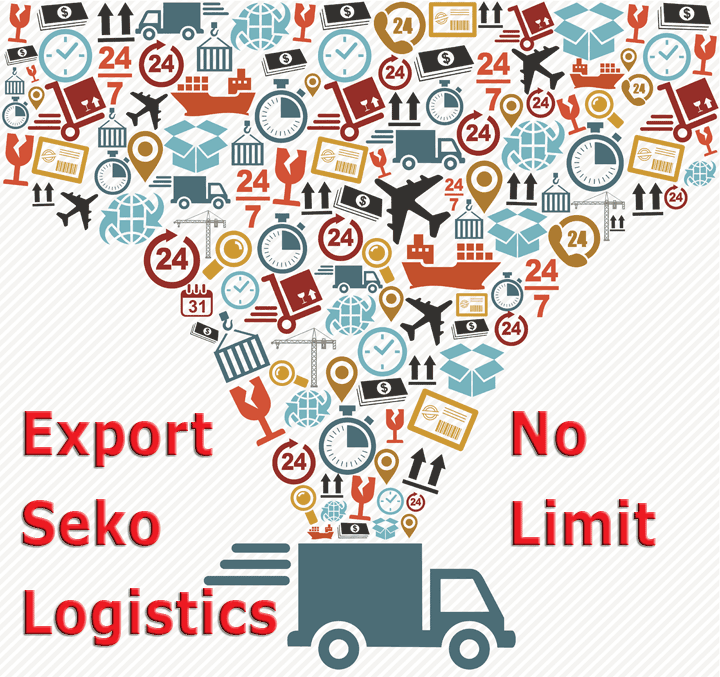
 William
J. Wascher has to be one of the most clued-in logistics executives in
the U.S. With strategic reach and a depth of knowledge across markets
rarely encountered, the president and CEO of Seko Logistics sprinkles
his insights into cargo markets. He is keen to talk air freight at the
moment, not least because it is proving a happy hunting ground for his
Chicago-based company. William
J. Wascher has to be one of the most clued-in logistics executives in
the U.S. With strategic reach and a depth of knowledge across markets
rarely encountered, the president and CEO of Seko Logistics sprinkles
his insights into cargo markets. He is keen to talk air freight at the
moment, not least because it is proving a happy hunting ground for his
Chicago-based company.
“Our continued growth and focus in
supporting retail and eCommerce has led to increased U.S. air export growth
to the point that we handle more air export consolidations than U.S. air
imports,” he told FlyingTypers. “This
is a huge shift for us and fairly unheard of in our industry.”
The biggest trade lane expansion for Seko
has been to Asia Pacific, especially Australia/New Zealand.
“This is due to their favorable customs
regulations as it relates to eCommerce, but also includes such markets
as Singapore, Malaysia, Thailand, and of course Hong Kong and China with
their rising middle class and domestic demand increases,” he explained.
“We continue to also see growth in
U.S. air export volume to western and northern Europe as the EU economy
rebounds, mostly led by the UK. We did not see much of the anticipated
modal shift in late 2014, or at least not as much as was perhaps expected.
To that extent, we did not see an increase in air cargo demand due to
the West Coast port congestion, but rather mostly due to continued growth
in Global eCommerce.”
This is not to say that West Coast port
congestion was not a factor in Seko’s outlook for 2015.
First and foremost the U.S. economy appears
to be heating up, although Wascher would like to see a few more months
of continued increases in GDP and retail sales to be convinced this is
a genuine upturn rather than restocking.
“Secondly,” he added, “the
simultaneous factors of increased instability during the West Coast port
situation and the decreasing fuel costs caused both a potential increase
in demand as well as a decrease in the total landed cost of airfreight.
“We’ve already seen one airline
begin to introduce all-in pricing including fuel and security beginning
in February 2015, and we expect other airlines to follow suit.
“As long as oil remains around or
below the symbolic threshold of $50/barrel, this trend will be significant
for 2015.
“And lastly, global eCommerce growth
will continue to outpace global retail growth and this will contribute
to a continued increase in demand, particularly for fashion and consumer
electronics. U.S. retailers are finally figuring out that they need to
diversify their customer base to include more than one home market and
are beginning to expand globally.”
Air cargo makes up roughly half of Seko’s
international transportation product mix and plays an essential part in
supporting key client solutions such as global Omni-Channel and eCommerce
logistics. The retail sector is the dominant
vertical across Seko’s air freight-using client portfolio, but the
company also has its corporate foot planted in the medical, high-tech,
and aerospace sectors, offering everything from air charters, product
launches and AOG (aircraft on ground) services alongside its standard
supply chain and forwarding operations.
“In 2015 SEKO will continue to expand
into key international markets,” said Wascher. “We have already
started with increased air cargo to the Middle East, and we will open
more offices in that region this year. Other regions of focus for expansion
for us are Africa, South Asia and Eastern Europe. East Africa to Europe
is actually one of our busiest air cargo lanes, supporting the fish industry
in the Great Lakes region.”
In Asia, Seko is firmly focused on understanding
and benefitting from the rise in eCommerce, which is driving air cargo
imports to middle class consumers. The company recently opened a new 30,000-sq.
ft. facility in Hong Kong to support eCommerce order fulfillment, and
is already looking to expand the facility to 100,000-sq. ft. to support
further anticipated growth in demand this year.
“In five years we would expect to
see the same need in both South and North China for fulfillment services,”
said Wascher.
He said the main obstacle to efficient air
freight operations to and from China was not customs policies but the
lack of infrastructure in tier 2 cities and inland markets.
“The biggest issue for medical devices
is related to their approval process for the use of new devices,”
he added. “A more transparent approval process will give the entire
medical industry—including pharma—better planning and therefore
growth and investment in the region.”
SkyKing
|





